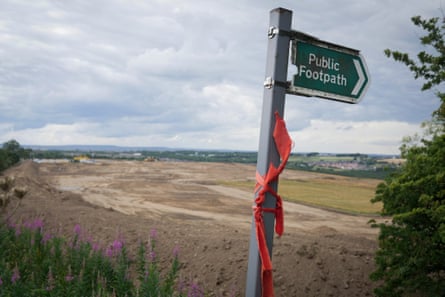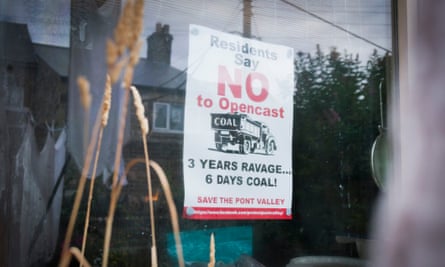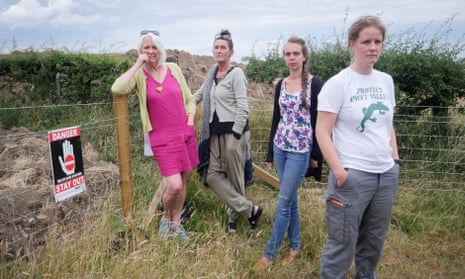From the end of her garden June Davison can see and hear the heavy machinery stripping away the valley. Soon there will be explosions and dust to add to the 12 hour thrum of engines as the coal is stripped from below the earth.
After 40 years of local opposition that has helped keep this area of the Derwent valley in County Durham untouched, open-cast mining has begun between the villages of Dipton, Leadgate and Medomsley, once home to a deeply entrenched mining community around what was South Medomsley colliery.
Today though, as the energy firm Banks Group begins to extract half a million tonnes of coal from the Pont valley, the mining takes place against a very different backdrop. The government has vowed to be a world leader in phasing out coal by 2025, coal-fired power stations are closing down and coal use has fallen by more than 80% since 2012 amid increasing environmental concerns and the need to meet Paris climate change commitments. Last year coal produced less than 7% of UK electricity. Protesters say it is the area’s heritage, not its future.
“This is a very strong local issue.. My community has been fighting the threat of open-cast mining here for decades,” said Davison. “But it is more than that, it is a national and international issue. The government says it wants to be a world leader but is not putting its money where its mouth is. It needs to act to stop open-cast mining here and the permanent destruction of the really diverse habitat in this valley, and everywhere else this mining takes place.”

Behind fences patrolled by security guards and dogs, off the main road between the village of Dipton, where Davison lives in a former miner’s cottage, and Leadgate, Banks employees have begun scraping the topsoil and subsoil away in preparation for the extraction of the coal about 50 metres below the surface, which will take two to three years.
Piles of earth surround the valley sides and the public footpaths, which until recently stretched down to the valley floor and out again, have been diverted to run alongside the main road. It is this “hit and run” open-cast mining which environmentalists say devastates habitats and wildlife.
The government appears to agree. Not far from Pont valley is the site of another planned Banks open-cast mine, at Druridge Bay in Northumberland. The mine was stopped in its tracks by the government in the spring because of the potential environmental damage. Sajid Javid, who was communities secretary at the time, called in the company’s attempts to extract 3m tonnes of coal, sandstone and fireclay, and rejected them because of the environmental impact and the “very substantial” impact on climate change. Banks is appealing against the decision.
Buoyed by the Druridge Bay rejection, protesters sent an 88,000 strong petition to Javid calling on him to prevent Banks from digging out Pont valley for the very same environmental and climate change reasons.

But this week Javid’s successor, James Brokenshire, told Davison and others he would not intervene. In a letter to the protesters’ solicitor, the minister said he could only revoke permission in exceptional circumstances and if the decision was “grossly wrong” and damage is likely to be done to the wider public interest.
Davison says she is shocked at the inconsistency in the government’s approach. “The coal phase-out announcement gave me hope that our valley would be saved. We asked for the government to stop this open-cast extraction in February, before Banks had really started destroying this habitat.”
Watching the heavy machinery scrape the valley floor away was devastating, said Robyn Clogg, who lives in Dipton. “I live here, I grew up here and spent my childhood playing in the valley. One of the reasons I live here now is to give my children access to the countryside and that is being taken away from us without any thought or awareness. It is the last amenity being taken from us.”
Claim and counterclaim has flown back and forth over the presence of protected species including the great crested newt in the valley in the last six months, just one aspect of the bitter battle that has raged between many in the community and the mining firm.

The first attempt to mine the valley was rejected by the county council in 1974, a further one thrown out in 1986 and again in 2011. But after a series of appeals a planning inspector granted UK Coal permission to mine in June 2015. When they went bust, the licence was taken over by Banks and in January they announced they would push ahead with the project.
“It caused a deep groundswell of anger,” said Alan Shield, county councillor for Leadgate and Medomsley. “Everyone thought it had gone away. There was a stream of protest because it was happening now, when fossil fuels are dated, a thing of the past. They are not the future, we should be investing in renewables instead.”
In a community still struggling with unemployment and deprivation caused by the end of the deep pit mining in the 1980s, and the closure of the steelworks in nearby Consett, Banks is promising 30 much needed jobs, and a community fund of £50,000 that the three affected villages have to bid for.
But despite the prospect of employment, the Durham Miners’ Association has come out in support of protesters against the open cast mine.
Alan Cummings, secretary for the association, said open cast mining “now threatens to ruin our environment for no perceivable benefit.
“Our communities have suffered enough … and they do not need to have more injury added to insult.”
At the recent miners’ gala the Pont valley protesters marched with their banner alongside the Durham colliery bands.

“The countryside is the only amenity left in ex-mining areas, and open-cast mining threatens to take that amenity away without offering meaningful jobs,” said Anne Harris of Coal Action Network.
Support for the Pont valley protesters reaches across Europe into Germany where campaigners against an open-cast mine in Hambach forest in western Germany, have built a community living in tree houses in a continued opposition to the mining. “When they arrived to support us it was like that scene in the Magnificent Seven when Yul Brynner comes across the plains,” said Davison. “It showed everyone that this fight is international.”
In the UK this month, leading environmental charities wrote to the government asking them to kill off new coal mines in the UK by reforming planning rules to block their development.
But Banks says it is committed to restoring the environment when its mining is concluded and has accused the protesters of not being representative of the community view.
Gavin Styles, managing director of Banks Mining, said he welcomes the secretary of state’s decision not to stop their work.
“Site operations at Bradley are scheduled to run for between two and three years, with all on-site activity complete in 2021. “Restoration of the site will include the creation of new woodland and a nature reserve area, as well as the return of some of the land to agricultural use, while the benefits fund linked to the project will provide funding for community improvement projects that will make a difference to the facilities available to local residents for decades to come.
“Supporting skilled British jobs, delivering regional environmental and conservation enhancements, avoiding the carbon emissions caused by importing the coal supplies that the UK still needs for steel, cement and other important industrial and household users, and providing a secure domestic supply of energy by meeting our continuing need for coal through domestic reserves makes far greater sense than relying on coal and gas imports from potentially-unstable overseas markets that are thousands of miles away.”
For Davison and others, the decision this week by Brokenshire not to step in has not weakened their resolve. She said: “What it does is give a clear message that we have to take direct action against open-cast coal.”
